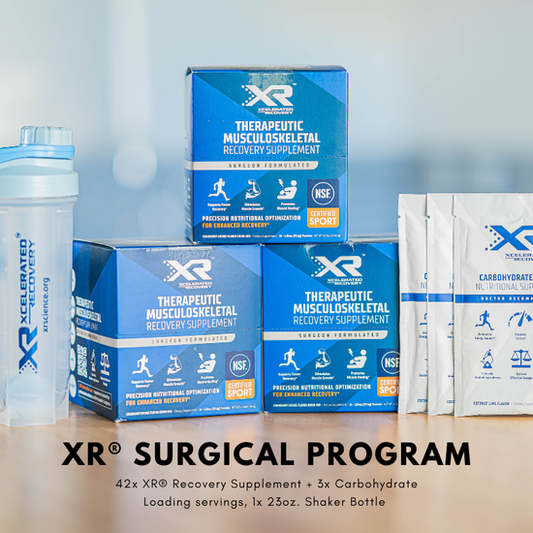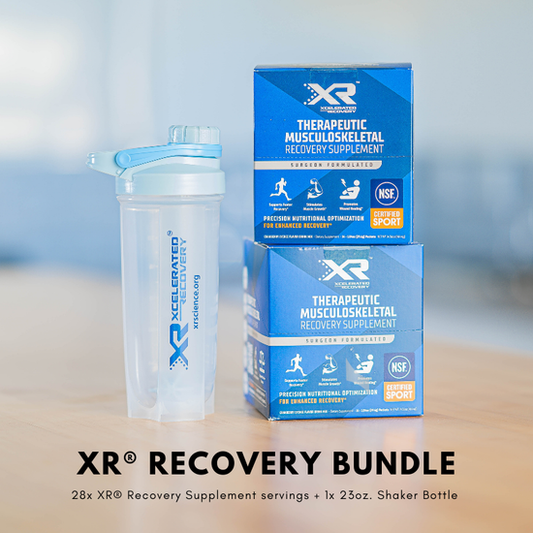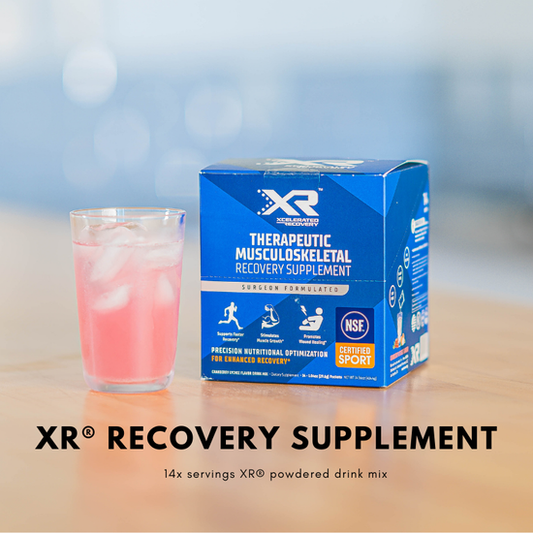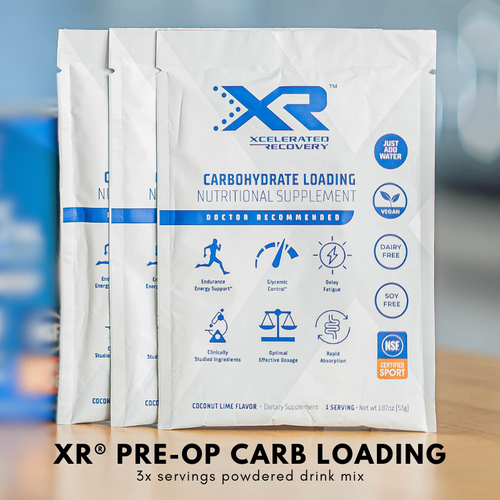
Optimizing Total Shoulder Replacement Surgery Recovery
Share
Nutritional Strategies for Enhancing Surgical Outcomes
Authors: Dr. Reza Jazayeri & Dr. Anshu Singh
According to the American Academy of Orthopedic Surgeons, Total Shoulder Replacements (TSR) are among the most frequently performed joint replacements surgeries, with more than 70,000 surgeries performed in the United States annually. The average demographic of individuals who undergo TSR are older adults, typically over the age of 60, with a high prevalence of osteoarthritis or rotator cuff disease, which is also the age in which both nutritional status and muscle mass tend to decrease.
This age group is particularly vulnerable to the surgical cascade, as Hirsch et al. (2021) have described as a “cascade of inflammatory, immune, and metabolic responses that result in a hypermetabolic-catabolic state”1.
This state leads to a significant increase in the demand for amino acids, and in an effort to meet energy demands and promote wound healing, the body breaks down skeletal muscle which is the body's reservoir for amino acids. This muscle breakdown leads to muscle loss (atrophy), which is often seen after surgery and is compounded by the limited activity and immobility that is part of the recovery process. Ultimately, this leads to a significant amount of muscle atrophy that is typically seen after surgery.
While TSR can be an effective treatment for reducing pain and improving function in the shoulder, there are several challenges and potential complications that patients and healthcare providers must be aware of. These can include infection, loosening, instability, bleeding and limitations in functional recovery.
Nutritional status has been identified to be a strong predictor of surgical outcomes in orthopaedic trauma2, total joint arthroplasty3,4, spine5, rotator cuff repair6,7, distal radius fracture, and more recently also in shoulder arthroplasty literature. Studies have demonstrated an increase in complications including infection, increased length of stay, and impaired wound healing in patients with poor nutritional status. A study published in the Journal of Shoulder and Elbow Surgery (2021) found that malnutrition, as measured by preoperative albumin levels, was present in 22% of overall elective shoulder arthroplasty patients, (32% of revision cases) and was associated with a significantly increased risk of adverse outcomes and increased length of hospitalization.
Another study published in the Journal of Shoulder and Elbow Surgery (2021) found that patients with malnutrition had a significantly increased risk of 90-day readmission and increased cost utilization following shoulder arthroplasty.
To support optimal patient outcomes after TSR, it is important for healthcare providers to focus on nutritional strategies that can help to improve the patient's nutritional status before and after surgery. This includes providing patients with clear information on the importance of good nutrition, identifying and addressing any specific nutritional deficiencies, and providing guidance on appropriate dietary choices.
There are several research-based nutritional strategies that can be utilized to enhance surgical outcomes after TSR. One key strategy is to ensure that patients are consuming an adequate amount of protein, as protein is essential for the repair and growth of tissue. Research has also shown that increasing the intake of omega-3 fatty acids and antioxidants can help to reduce inflammation and improve wound healing.
Another important strategy is to focus on maintaining muscle mass and strength in the shoulder before and after surgery. This can be achieved through pre-surgical exercise and physical therapy (prehabilitation), as well as post-surgical rehabilitation.
Multiple studies have demonstrated the efficacy of nutritional supplementation in enhancing surgical outcomes in orthopedic surgery. A study published in the Journal of Athletic Training (2020) by Smith-Ryan AE reported that nutritional considerations and strategies, such as protein and nutritional supplementation, can facilitate injury recovery and rehabilitation. A study by Johnson JL et al. (2012 JOSP) found that preoperative supplementation of vitamin C and zinc improved the outcomes of rotator cuff repair surgery.
Additionally, multiple studies have found that supplementation combining β-hydroxy-β-methyl butyrate, L-arginine, and L-glutamine improved postoperative recovery of quadriceps muscle strength after total knee arthroplasty. Similar benefits have been found in trauma patients, as highlighted in the study by Hendrickson (JBJS 2022) who were supplemented with 2 weeks of conditionally essential amino acids, had significantly lower complications and preserved muscle mass after surgical intervention. This growing body of research supports the use of nutritional supplementation in enhancing surgical outcomes in a wide variety of orthopaedic patients and will likely offer similar benefits to patients recovering from shoulder arthroplasty.
In summary, TSR is a common surgical procedure that can be effective in reducing pain and improving function in the shoulder. However, there are several challenges and potential complications that patients and healthcare providers must be aware of. Nutritional status is a key predictor of complications after TSR, and utilizing research-based nutritional strategies can help to enhance surgical outcomes and improve patient recovery.
References:
- Hirsch KR, Wolfe RR, Ferrando AA. "Pre- and post-surgical nutrition for preservation of muscle mass, strength, and functionality following orthopedic surgery." Nutrients. 2021;13(5):1675.
- Hendrickson. Conditionally Essential Amino Acid Supplementation Reduces Postoperative Complications and Muscle Wasting After Fracture Fixation A Randomized Controlled Trial, JBJS 2022
- W. C. Schroer, A. R. LeMarr, K. Mills, A. L. Childress, D. J. Morton, M. E. Reedy 2019 Chitranjan S. Ranawat Award: Elective joint arthroplasty outcomes improve in malnourished patients with nutritional intervention a prospective population analysis demonstrates a modifiable risk factor Bone Joint J 2019;101-B(7 Supple C):17–21
- William C. Schroer, MD ,Paul J. Diesfeld, PA-C, Angela R. LeMarr, RN, ONC, Diane J. Morton, MS, Mary E. Reedy, RN, ONC Modifiable Risk Factors in Primary Joint Arthroplasty Increase 90-Day Cost of Care Journal of arthroplasty. 2018VOLUME 33, ISSUE 9, P2740-2744
- Khalooeifard, Razieh 1 ; Oraee-Yazdani, Saeed 2 ; Keikhaee, Mohsen 2 ; Shariatpanahi, Zahra Vahdat 1 ;Clinical Spine Surgery, Protein Supplement and Enhanced Recovery After Posterior Spine Fusion Surgery : A Randomized, Double- blind, Placebo-controlled Trial Volume 35, Number 3, 1 April 2022, pp. E356-E362(7)
- Quan T, Lopez JD, Chen FR, Manzi JE, Best MJ, Srikumaran U, Zimmer ZR. A retrospective study evaluating the association between hypoalbuminemia and postoperative outcomes for patients receiving open rotator cuff repair. J Orthop. 2022 Feb 23;30:88-92. doi: 10.1016/j.jor.2022.02.023. eCollection 2022 Mar-Apr. PMID: 35250196
- McGlone PJ, Li LT, Bokshan SL, O'Donnell R, Owens BD. Preoperative malnutrition increases odds of hospital admission and extended length of stay following arthroscopic rotator cuff repair. Phys Sportsmed. 2021 May;49(2):236-240. doi: 10.1080/00913847.2020.1824535. Epub 2020 Sep 23. PMID: 32928015
- E.M. Flamant et al. “Malnutrition in elective shoulder arthroplasty: a multi-institutional retrospective study of preoperative albumin and adverse outcomes.” J Shoulder Elbow Surg (2021)
- R.A. Burnett et al. “Characteristics and risk factors for 90-day readmission following shoulder arthroplasty.” J Shoulder Elbow Surg (2022)
- Smith-Ryan AE. "Nutritional considerations and strategies to facilitate injury recovery and rehabilitation." Journal of Athletic Training, 2020;55(2):169-183.
- Johnson JL, et al. "The effects of preoperative supplementation of vitamin C and zinc on rotator cuff repair." Journal of Orthopaedic & Sports Physical Therapy, 2012;42(11):967-974.
- Dreyer et al. (2019) Essential Amino Acid Supplementation Mitigates Muscle Atrophy After Total Knee Arthroplasty
- Nishizaki et al. (2015) J Clin Nutr Effects of supplementation with a combination of β-hydroxy-β-methyl butyrate, L-arginine, and L-glutamine on postoperative recovery of quadriceps muscle strength after total knee arthroplasty
- H. Ueyama, Bone Joint J 2020;102-B(6 Supple A):10–18 2020 Chitranjan S. Ranawat Award: Perioperative essential amino acid supplementation suppresses rectus femoris muscle atrophy and accelerates early functional recovery following total knee arthroplasty
- Hans C. Dreyer et al. J Clin Invest. 2013;123(11):4654-4666 Essential amino acid supplementation in patients following total knee arthroplasty








